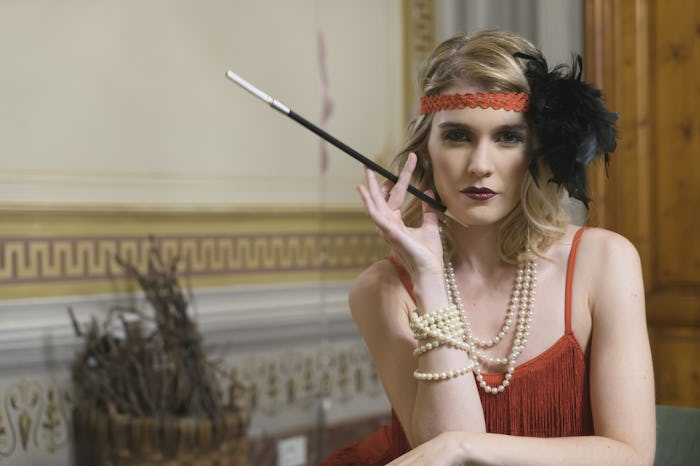Life

9 Things Parents In The ‘20s Did That We Don’t Do Today
Parenting advice from the '20s may seem a little obscure, but one of the most interesting things about that era, that's still around today, is the prevalence of parenting advice books. This, of course, makes it easier for us to judge those experts and parents on the wacky things they did to their children, which is essentially an extensive a list of things parents in the '20s did that we don't do today. Like, at all, and for good reason.
While I can't speak for everyone, I think it's safe to assume that most people think of the "roaring '20s" when someone references the decade. If it really was roaring, I guess it's no wonder doctors and parents were trying to reign their kids in and keep them from getting spoiled (I'm looking at you, Gatsby and friends). But those roaring '20s parents went to some extreme measures to try to keep their babies from turning into spoiled brats. For example, hand shaking, limited cuddling, and withholding of kisses were among their tactics when it came to showing their children affection. Thankfully, I can safely say the majority of us parents have safely denounced nearly all of their parenting plans nearly 100 years later.
But the '20s did have a few parenting choices we are starting to bring back; mostly baby girl names which have started circling back around and, as a result, are becoming popular again. For example, thank the '20s when you hear names like Hazel, Eleanor and Grace. It'll probably be a while before we hear a Mildred or a Phyllis, though, and it will definitely be a while (read: never) before the following parenting practices become a "thing" again:
They Blamed Angry Moms For Causing Colic
In the '20s, it was believed that angry mothers were the cause of their baby's colic. That's a pretty big chicken and egg problem, don't you think? I might be mistaken for being a little angry if my child wouldn't stop crying 24 hours a day, too.
Thanks to science, we know a parent isn't to blame for colic in a newborn. In fact, and while the cause of colic can be uncertain, most pediatricians believe crying can cause severe gas pain (the baby swallows air while they cry) which ends up as colic.
They Withheld Kisses
Once a day on the forehead, "if you must," was the frequency in which '20s parents kissed their children. I don't know about you, but I give my daughter at least 20 kisses before we even think about beginning our day.
They Blamed Moms For Birthing "Ugly" Babies
According to '20s logic, if a baby was perceived as "ugly" it was because the mother was "thinking ugly thoughts" during her pregnancy. Yay for science, debunking this sexist (not to mention, just mean!) viewpoint.
They Would Only Shake Their Baby's Hands
In the '20s, parenting experts thought it was a good idea to treat a baby like an adult, so they could grow up and become a productive member of society quicker. I have a feeling this didn't necessarily work out the way parents had hoped.
They Let Their Babies Drink Coffee
Apparently it was perfectly OK to give babies black coffee from the time they turn 6 months old, so they could get used to the "the normal eating habits of the family." Can you imagine the fortune hipster coffee joints would make if that was still the case today?
They Limited Cuddle Time To 10 Minutes
In addition to one kiss on the forehead once a day, parents were only "allowed" 10 minutes of daily cuddling time. All in the name of not spoiling your child. How horrific! I mean, cuddling is arguably one of the best parts of parenthood, right?
They Would Leave Their Babies Outside To "Toughen Them Up"
The preoccupation with making babies tougher is so interesting to me. The only job a baby has is to be the opposite of tough, in my opinion. Still, in the '20s it was less about caring for your baby and more about preparing your baby for the harsh reality of the world as quickly as humanly possible.
They Only Did Cry It Out
Going along with the overarching theme of toughening babies up, and not letting them get too spoiled or soft, crying it out was the only recommended option in the '20s.
They Let Them Cry To Develop Strong Lungs
Crying it out wasn't just so a baby could learn to self-sooth. Parents in the '20s would allow their children to cry for indefinite periods of time all because they thought it helped their lungs develop. Thankfully, now doctors and parents know that's not how the human body works.